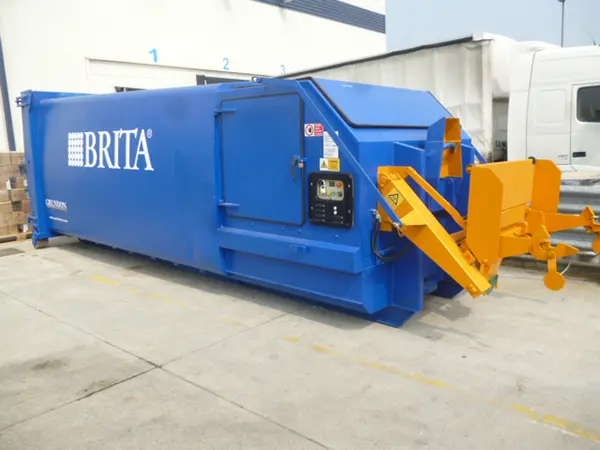As a world leader in water filters, BRITA takes its commitment to the environment very seriously, and its green credentials are one of the reasons it attracts successful partnerships with many top brand names such as Sainsbury’s, Tesco, Costa Coffee and Argos.
When it comes to waste management at its UK headquarters in Bicester, BRITA has chosen to work with Grundon Waste Management, a relationship that has delivered a raft of major improvements.
These include:
- achieving zero waste to landfill
- identification of 30 different waste streams
- creation of a green team of waste champions
- introduction of a sealed compactor unit to stop the disposal of non-conforming waste
- significant reduction in the number of vehicle collections
Bryan Edwards, Professional & Services Warehouse Manager, at Bicester, says Grundon’s input has been invaluable.
“When we started working together in 2014, the first thing Grundon did was to empty our existing mixed waste compactor onto the floor at its local transfer station in Banbury, so we could see what was going into it,” he said. “Because we weren’t able to control the materials going in, we found all sorts of things and there were some real surprises, all of which added to the volume of our own site waste.”
With Grundon’s help, samples were taken from a wide variety of different items – including silicon labels, polystyrene and packing paper – enabling a total of 30 different waste streams to be identified.

“We were aware of the more obvious items, such as cardboard and plastic, but Grundon showed us all the other ‘extras’ that could be recycled or reprocessed and they knew what to do with them. They encouraged us to segregate the waste streams internally and helped us understand how they should be processed and baled through the compactors ready for collection,” continued Bryan.
“It also means we have dramatically reduced the number of vehicle collections necessary, making us much more carbon friendly. And even now, when we have a review, our account manager will always be looking for something new to segregate and help us get that little extra something from our waste.”
Leading the Grundon team is James Standen, who said: “We were able to show BRITA what could be achieved and how much more they could get by segregating their waste.
“The fact we can handle all their different waste streams means they have just one point of contact, and in return we provide all the necessary recycling statistics on how much waste they are producing, where it is going and the savings achieved.”
Over a 12-month period, statistics show that eco-savings have amounted to nearly 55,000 kg of CO2, the equivalent to 1,919 trees, was saved and almost 29 MWh of power was generated.
BRITA’s manufacturing process creates around 2,000 tonnes of waste a year but less than 30 tonnes of that is residual waste – all of which Grundon transports to Viridor’s Energy Recovery Facility (EFR) at nearby Ardley.
To help tackle the problem of non-conforming waste, an enclosed, lockable compactor has now been installed, completely removing any opportunity for the disposing of unwanted waste and ensuring that when residual waste goes to the ERF plant, it is high quality material and meets all the necessary regulations.
Among the other changes has been the arrival of a new polystyrene compactor, which takes waste polystyrene and compacts it into briquettes for reprocessing.
In the offices, under-desk bins were removed and replaced with bin stations, all clearly labelled and a new BRITA Green Team, comprising of 10 employees from across different departments – including finance and marketing – was tasked with overseeing the changes.
“They effectively became bin monitors for the first few months, making sure that the right waste was going into the right bins,” said Bryan. “It was also important to get the message across about trying to reduce the amount of paper we print.
“For example, we have lots of vendor manuals, so we undertook an education campaign asking people if they really needed to print something out, and that also helped to change the way people work.”
Conscious of the need to avoid having too many different bins in multiple locations, Bryan says the team used a rule of thumb which said most areas would have two bins to collect the highest likely amount of materials to be recycled from that area, while remaining items would be taken to bin stations elsewhere.
“As a business, recycling is really important to us and from a green partnership and marketing point of view this is an excellent message to share with our customers,” he said.
“Some 90% of our commercial customers have recycling bins in-store to enable water filter cartridges to be returned. We return these to BRITA in Germany for reprocessing and we re-use or recycle as much as we can, including the plastic jugs themselves.”
Viridor’s team was so impressed with the success achieved by BRITA and Grundon that earlier this year two of its Visitor Centre team took a tour of BRITA’s facilities to find out more.
Afterwards, Sylvie Verinder, Visitor Centre Manager, said: “We were incredibly impressed by the lengths that BRITA go to in order to manage their resources and what incredible foresight they have in terms of their vision for lean manufacturing and moving towards a circular economy model.
“The partnership between BRITA and Grundon is a great example of tracing all materials throughout the chain to ensure that all your resources follow the waste hierarchy to the letter.”

Comments: 0
No comments yet, why not be the first?